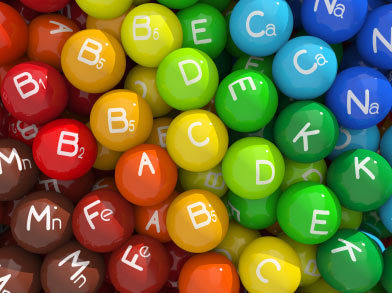
You'd think that with all the progress the world boasts of today, people would enjoy better health. Unfortunately though, the reverse is true. Few people today bother to make themselves a nutritious meal. Add to this the fact that there are fewer food items available today that naturally supply us with all the vital vitamins and minerals, and you'll realise why it's time we took notice.
Enter Fortified Foods and Supplements
A recent study proves that the nutritional value of naturally occurring food like vegetables and fruits has radically reduced in the last 50 years. Tim Lang, a professor at the Centre for Food Policy, London estimates that one has to eat almost eight oranges today to get the same amount of vitamin A that our grandparents did from one orange!
In this vitamin and mineral-deficient context, you need to supplement your diet with the required minerals and vitamins in a form that is easily absorbed by the body.
The Vital Vitamins
- Vitamin E: An antioxidant that reduces the risk of strokes, heart failure and Alzheimer's, Vitamin E is particularly recommended for the elderly. When taken by women, it controls vaginal dryness, mood swings, anxiety disorders and fatigue. It is best taken in combination with other nutrients like magnesium, potassium, bioflavonoids and the B vitamins.
- Vitamin C: Also an antioxidant, this vitamin protects the brain against Alzheimer's, helps you tackle stress and gives you protection against the common cold.
- Vitamin D: Vitamin D aids in calcium absorption; when taken with calcium, it can do wonders for your bones. Vitamin D also prevents rickets in children and osteoporosis among women, besides fighting off hypertension, diabetes, cancer, rheumatoid arthritis and multiple sclerosis.
- B complex is an anti-stress compound, with vitamins B1 (thiamine), B2 (riboflavin), B3 (niacin), B5 (pantothenic acid) and B6 (pyridoxine) playing a pivotal role in relieving headaches, when taken in combination with Vitamin C. Vitamin B9 or folic acid is also important, especially during pregnancy with deficiency resulting in birth defects. Research also proves that folic acid slows the dangerous side-effects of ageing.
The Minerals that Matter
- Chromium: Essential for maintaining normal water balance and regulating the break down of sugar and carbohydrates.
- Cobalt: Helps form red blood cells and maintains nerve tissue.
- Fluoride: Strengthens bones and teeth.
- Iodine: Regulates the thyroid.
- Iron: Stimulates a healthy immune system.
- Manganese: Fights cancer cells.
- Molybdenum: Crucial for the synthesis of proteins and for maintaining a healthy nervous system.
- Sulfur: Has antibiotic capabilities.
- Zinc: Helps in the production of white blood cells and heals wounds.
- Selenium: Supports the immune system, protects from cancer and reduces inflammation.
Long-term Effects
While a conscious effort to eat a well-balanced meal can reap rewards, you'll never be sure if your body is getting the adequate amount of vitamins and minerals. In the short term, deficiencies can hardly be a cause for alarm, but a prolonged delay in supplementing your diet could have drastic repercussions.